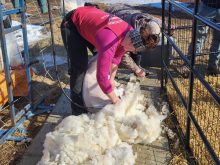After nearly four years of wrangling with the province over a proposed law governing the use of crown land, the Alberta Grazing Leaseholders Association continues its struggle to make major changes to the controversial legislation.
Bill 31 passed third reading last year, but has not received royal assent. Regulations to accompany the bill have yet to be written.
“We’re not going to change the whole bill,” said MLA Dave Broda at the grazing leaseholders association’s annual meeting in Calgary on Jan. 10.
“If there is anything in the bill that has to be readjusted, we’re looking at doing it through regulations.”
Read Also

Charges laid after cattle theft
Saskatchewan RCMP lay two charges against a man after six cattle went missing.
Broda was appointed by agriculture minister Ty Lund to speak with land users, including energy companies, ranchers, recreationists and wildlife groups, and recommend regulations.
Revisions could include such things as changing the name of crown-owned land from public land to provincial land.
“When it was changed to public lands some years ago, there was a perception in the public that everybody should be able to use it,” Broda told association members.
“You as stewards should be able to have control over who uses it and when.”
Typically, leaseholders may deny access if there is a high fire hazard, when cattle are grazing in the area, during breeding season and if the number of people in the area is too high.
Bob Porter, who ranches near Medicine Hat, told Broda that leaseholders are frustrated that the same points within the bill continue to be debated after four years.
“It is much easier to make those adjustments within the legislation prior to getting it to the point that you have,” he said.
He worries the government is attempting to appease land users without having to back down on a piece of unpopular legislation.
“I am concerned about the process. We have got ourselves so far down the slippery slope that maybe you guys can’t back up.”
He said the group represents Canada’s strongest agricultural sector and deserves attention.
“It could be jeopardized by some of the ramifications of this legislation.”
No one can predict when the bill might become law. A provincial election is expected for early spring, but Broda said that should not affect the bill’s fate.
Association chair Jack Horner said there is a remote possibility the bill will die.
A committee of agricultural and petroleum industry representatives was formed last year to try changing the legislation through its regulations.
“We have to try our damnedest to get the government to change it so it would at least be workable,” Horner said.
The committee proposed four major regulatory changes:
- Kill the bill’s section 79, which allows the government to remove mineral leases from a grazing disposition. Under the change, the government would receive compensation for damages caused by energy companies.
- Preserve leaseholders’ rights preserved under the surface rights act.
Under the new act, the leaseholder is no longer considered an occupant of that land and loses the right to appeal before the surface rights board if there are conflicts with energy companies.
- Give leaseholders control over when seismic operations and oil and gas exploration take place on leased land. The new bill takes away leaseholders’ rights to refuse entry to such activities.
- Allow leaseholders to keep the right to control public access. Hunters, hikers, recreationists and other members of the public should obtain permission before entering the property, the committee said.

















